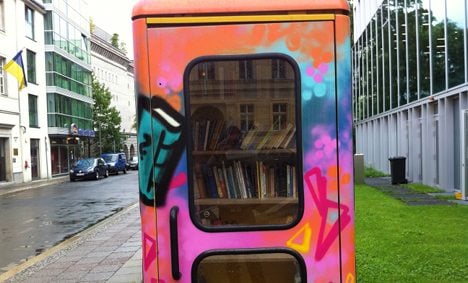Technologies may change, but basic human needs never do.
Once ubiquitous telephone booths have lost relevance in world dominated by mobile phones, even though people still need to communicate with each other. And reading remains key to human existence even if books are slowly being replaced by iPads and the internet.
So it’s perhaps surprising that someone eventually decided to marry the two antiquated technologies for a literacy project.
But Konrad Kutt of the Institute for Sustainability in Education, Employment and Culture (INBAK) decided to start the BücherboXX initiative, which involves telephone booths and lots of books, to promote reading in Berlin and beyond.
Kutt and INBAK have been spreading a simple idea around the German capital for the last year and a half: Fill telephone booths that are about to be thrown away with books and put benches outside for people to sit down and take a reading break.
“It teaches people about reusing items, about sustainability and also about promoting learning,” said Kutt, who is leading the project. “The idea is why throw things away when we can just reuse them anew?”
Each of Berlin’s three current BücherboXXes has been colourfully painted by students who also are responsible for building the benches and bookshelves inside the booths. The telephone booths themselves are bought from telephone companies set to just throw them away. Once ready to go, they’re put on neighbourhood streets and are open for business.
Specially deputized community members keep an eye on the booths to prevent vandalism and make sure they are cleaned on a regular basis. Locals who visit the boxes are encouraged to leave one of their own books when they take a book with them.
There are no sign-out sheets or regulations for visitors to follow, like at a library Kutt said. The BücherboXX system relies on trust and the community’s good will.
Their open nature and lack of monitoring mean it’s tough to estimate how many people have actually used the booths. Visitors per day can range from just a few to dozens in a busy central neighbourhood.
But there’s no question, that they’re being used and other cities want to copy the idea – Kutt said he’s working on building 12 booths around Berlin before launching the project Europe-wide.
“Everyone thinks they’ll suffer from vandalism, but they really haven’t,” he said. “The community seems to really take care of them.”
But he admits there are some challenges. Kutt tries to make sure troublemakers don’t drop off inappropriate literature, such as extreme right-wing writings or pornography. He’s also constantly cleaning out his booths to throw away advertisements or political newspapers people dump inside.
Kutt recently cleared some advertising newspapers out of one BücherboXX near Berlin’s Friedrichstraße rail station as curious people drove by on their bikes.
One woman, 45-year-old social worker Petra Rücker, stopped by to take a look at the selection, which included classics like Goethe’s “Elective Affinities” and Günter Grass’ “The Tin Drum.”
“I come by here on the way to work but never have stopped by until now,” Rücker said. “It looks interesting.”
This time, she left without a book.
“But I’ll definitely be back here,” she said.
Moises Mendoza



 Please whitelist us to continue reading.
Please whitelist us to continue reading.
Member comments